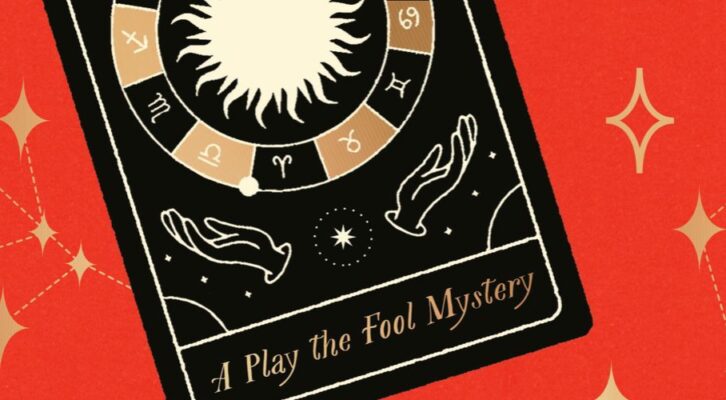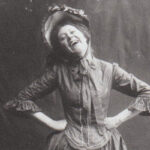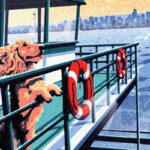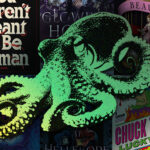My Last Conversation with Ursula K. Le Guin
John Freeman on a Cherished Visit to the Beloved Writer's Home
For the past 57 years, one of the most original imaginations ever to grace American letters has lived in a hundred-year-old house built from a kit from Sears.
“You could order it out of a catalogue,” its owner, the writer Ursula K. Le Guin, told me three years ago.
It’s late 2014 and Le Guin—the writer who invented modern science fiction, and did so much world building—is standing on her porch, peering out at a light Portland drizzle.
“They probably even sold you the lumber, too.”
It was here, down the hill from Pittock Mansion, near two other houses of the same design, that Le Guin launched a career that literally changed the face of American writing.
In the 1960s realism dominated American letters. Science fiction was the bastion for engineer geeks. And then Le Guin emerged with a series of books that challenged the way we think of civilization: not just our technology.
Chief among them was The Left Hand of Darkness, Le Guin’s 1969 novel set several thousand years in the future on an ambisexual planet, where men and women take on male or female sex characteristics depending on their relationships or desires.
Le Guin wasn’t just ahead of the curve in contemplating the social construction of gender. While science fiction zoomed toward the technological future, she wrote about anarchist movements, the way societies create aliens within themselves, and climate change.
“Of many present day memes,” Margaret Atwood wrote in an email, “well might it be said; Ursula got there first!”
And she did so by writing of characters with profound inner lives and terrible dilemmas. Junot Díaz, the Pulitzer Prize-winning author of The Brief Wondrous Life of Oscar Wao, was given her books in elementary school and found them far more than escape pods.
“What interested her the most it seemed in my opinion is the hard art of human wisdom, how desperate we all are for it and yet how it can only ever be learned by confronting suffering and loss and responsibility—by in other words growing up.”
Forty-eight years and nearly as many books later, the genre Le Guin made her own has itself grown up—writers from David Mitchell to Salman Rushdie and Karen Russell have walked through the door Le Guin built—and in tribute Le Guin was honored with one of the nation’s highest prizes, the National Book Foundation’s medal of lifetime achievement, a prize which has previously been accepted by Saul Bellow, Toni Morrison and Joan Didion.
“Of many present day memes,” Margaret Atwood wrote in an email, “well might it be said; Ursula got there first!”
“It’s more important than I thought it would be,” Le Guin tells me that rainy day in her sitting room, a tidy shelf of books by Margaret Atwood, Italo Calvino, and Virginia Woolf peering down on us nearby. A grandfather clock ticks through the quietude.
“After it was announced I got feedback from people and realized that it’s really cool because it’s acknowledging a genre writer for their first time with a major award. So that makes me very happy that I can get up there and say I’m accepting this for all of us who were considered outside literature for so long.”
Le Guin did not set out to write science fiction or create fantasy worlds. She simply did it because the forms did not restrict what was possible. “I wrote within the genre because I sold within the genre, but I also wrote what I wanted to write. I think I actually by writing in the genre I was freer than other writers who tried to be successful in the mainstream.”
In the pantheon of influential American texts, an interesting division might be found in writers who point more to The Left Hand of Darkness than another novel published that same year, Philip Roth’s Portnoy’s Complaint.
“He’s an awfully male writer. It’s sort of like he doesn’t want me in his world,” Le Guin, says, turning her eyes away.
*
To sit and talk with Le Guin over an afternoon was to engage a powerful mind that has responded to ideological entrapments or career bumps by carpentering a new space for itself. She was brisk and funny, but unsparing when asked to comment on something which, in her mind, does not measure up—such as Doris Lessing’s late work.
“She got so grumpy!” Le Guin says, laughing.
Le Guin was schooled in this independence young. She was born in Berkeley, California in 1929, where her father Alfred Kroeber launched the anthropology department at the University of California.
Le Guin’s mother, a writer and anthropologist as well, Theodora Kroeber, wrote a hugely influential account of the life of Ishi, the last remaining member of a tribe of the Yahi people from California.
“When he was the last of his people he just came out of the hills in northern California, from a little cow town, to die because he figured they’d shoot him,” Le Guin says. “Instead of which, the times had changed, it was 1910 I think, and [someone] notified the anthropologist at the University of California. ‘We got this wild Indian!’
“They asked my father to write the story, and he said ‘I don’t write books about my friends.’” Le Guin’s mother wrote the book instead.
Books were everywhere. Nursery rhymes were read to Le Guin and her siblings, all of whom have become professors or writers, so a literary awakening never happened because it was as part of their world as breathing. Le Guin’s parents’ friends were a walking demonstration of the power of diaspora.
“Berkeley was very welcoming to refugees of Hitler, so it was full of exiled intellectuals, mostly Jewish. It was an amazing place in the 30s and 40s.”
Le Guin began submitting science fiction stories to journals at age 11. Among her classmates at Berkeley High School was another future great in the genre, Philip K. Dick, whose novels and stories Do Androids Dream of Electric Sheep?, “We Can Remember it For You Wholesale” and “The Minority Report” have become enormous successes as films. “No one knew him!” says Le Guin now laughing. “No one in my class has any memory of him being there. There’s no picture in the yearbook. He was the invisible boy. I don’t know if he was sick a lot or what. I can’t figure it.”
Le Guin is quick to admit that this was a privileged background. She also notes it was impossible to be unaware of that in the 30s and 40s there were other Americans for whom this was not so. “Poverty was way more visible in the 30s.”
“There were kids everywhere, not just in inner cities, kids who were dirty and badly dressed. Unlooked after. There were people with weird clothes because they didn’t have any other clothes. People who are really hungry and miserable can look really respectable now. It was a lot harder in the 30s I think.”
Meanwhile, her own direction coalesced. “I just wanted to write books. And my father talked to me about it when I was 15 or 16 and said ‘It’s going to be very hard to make a living as a writer. You need a union card.’ And I said, ‘I love studying languages. I could teach language.’ And he said, ‘Okay!'”
Le Guin traveled east for university at Radcliffe College in the late 1940s, where she studied French and Italian literature and her classmates included the late, great poet Adrienne Rich. “I knew her boyfriend. Oh man, he adored her. He never got over her. When she went lesbian he just couldn’t believe it. He said ‘But she used to dance on the tables!’ Poor guy. She broke his heart.”
She continued on to Columbia for a graduate degree in literature and sailed to France on a fellowship for more study. A life in academia, it appeared, awaited. Then she met her husband, Charles Le Guin, a professor of English, on the boat. “Most of [students on the trip] were undergraduates. We were graduates. So he was the only other person who wanted to get a drink after dinner so we met. Went off to the bar.”
They married shortly after landing, and have been together ever since, raising three children through 50 years of Charles’ teaching and Le Guin’s nearly 50 books. The pram in the hall did not psych out Le Guin the way it has done so to male writers. “I used to write between 10 and 12 at night with three kids. Pretty well takes up the day. And I couldn’t have done it if Charles hadn’t been completely in on it too. One person cannot bring up 3 kids and write full time. No way. But two people can do two full time jobs and kids.”
*
Publication did not come easily for Le Guin. Her first five novels were rejected by publishers as were countless short stories. She didn’t stop. She’d even resorted to asking one of her father’s friends, the publisher Alfred A. Knopf, the lion whose list ran from Albert Camus to Thomas Mann, to read a manuscript. He did, and it was also a no.
“Its funny how there’s a kind of freedom in being shut out,” Le Guin says now. “You are outside the gates, okay, well then, you do what you plenty well want to do.” In Le Guin’s case, that meant inventing a middle European country called Orsinia, and an entire civilization to go with it. (She later collected them in Orsinian Tales). At some point, Le Guin began to play around with science fiction, and her stories were accepted. The Left Hand of Darkness was Le Guin’s sixth book and a massive success, selling millions of copies.
With visibility came prominence and a new power to her ideas. Le Guin admits she was late to feminism, hurtling then into its noisy third phase. “It was a real mind shift. And I was a grown woman with kids. And mothers of children were not welcome among a lot of early feminists. I was living the bad dream. I was a mommy. You know there’s always prejudice in a revolutionary movement. I wasn’t even sure I was welcome. And I wasn’t to some of those people. It took a lot of thinking for me to find what kind of feminist I could be and why I wanted to be a feminist.”
“There’s a kind of freedom in being shut out. You are outside the gates, okay, well then, you do what you plenty well want to do.”
Le Guin’s feminist breakthrough didn’t happen until the late 1970s when she published The Eye Of Heron, her first novel with a female heroine. In the middle of writing it, her hero died, stopping her dead in the composition. Le Guin got the Norton Anthology of feminist literature and found with work “I was able to write from the female point of view instead of essentially writing as a male the way almost all writers did. Atwood was ahead of me there probably. She was a more conscious and outspoken feminist earlier than I was.”
Atwood and Le Guin met not long after this period at a conference and have been in correspondence—sometimes argumentatively so—ever since. As much as Le Guin wants more than anything to be treated simply as a writer, she bristles when writers slum in science fiction. “We argued pretty fiercely what to call it when she’s writing science fiction and is refusing to call it science fiction.”
Uncharacterisitically, Le Guin backs up and praises: “She really was doing awfully good poetry and fiction feministically ahead of most people I think. I reread The Handmaid’s Tale to see if it held up, and it does.”
*
If on some fronts she took her time to join the present, on others the world lagged sadly behind. “It haunts me when people tell me how incredibly farsighted I was to be talking about climate change and climate destabilization and the degradation of the natural world, back in the 60s. I wasn’t! I was just listening to the scientists.”
There were other things science fiction missed back then, Le Guin points out: the internet, for starters, and further back, the atomic bomb. For Le Guin, the question of technology is not simply a question of morality of its users: “Is a gun neutral really? Is poison neutral really?”
“That’s the insane thing in south Oregon, they’re poisoning the poor people that live near Clear Cuts by helicopter spraying. What for, for heaven’s sake? What weed is worth killing dogs and people for? Anyway, this is sort of why I was always a maverick science fiction writer, because it wasn’t always the technologies that interested me; it was the science. I have considerable faith in science. Not blind faith of course, but scientists do, if they’re not owned by corporations, they do try to think things through. And most of us don’t.”
In a world suffused by climate change blockbuster films and zombie apocalypse TV shows, Le Guin feels we enacting our fears, but still giving ourselves a pass. “I think we’re afraid of what’s really happening. And [in these films] it really isn’t real, so we can enjoy all the violence and destruction without facing what we’re doing. I think this is just how human beings are. I don’t mean it as a judgmental statement about other people. We just have a lot of trouble being realistic about what we do.”
The biggest frontier of fantasy is, she finds, right in front of us: old age. “There’s plenty of good writing about being in your 60s and 70s. That’s easy. Because you still have the energy and the stamina.” But beyond that, where she finds herself now, Le Guin feels she is standing on wide-open terrain.
“I’m 85 now, and in doctor language, I’m old old. And it hasn’t been written about much. Partly because some of us are dying and some of us are sick. So it gets written about by people who aren’t old and they imagine what it’s like to be and they don’t get it right.”
Will there be time? “Every time I finished a novel I thought, that’s it, I’m done, I’m all washed up. Something would come along.” Now she finds poetry comes most easily. A new book of her verse is due out next year. She shrugs like, what else can she do?
“I’m in a little group, eight of us, that write for each other and read to each other.”
It sounded like storytelling returned to its most primal, elemental moment: people, passing the time, turning the light of their imagination on each other.




















